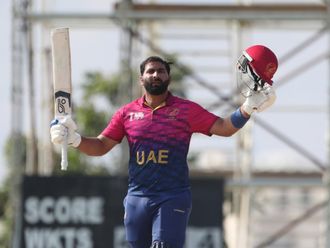Baku, Azerbaijan: Even before their first opening ceremony, the European Games are struggling.
Created to provide a European version of long-running continental competitions such as the Pan-American Games and Asian Games, the first edition of the European Games has been battered by sporting and political turmoil.
Without any high-level track and field or swimming competitions - traditionally the two most popular Olympic sports - there are questions over the European Games’ credibility as a sports event. Host nation Azerbaijan brings immense oil wealth to the table, but also a much-criticized human rights record.
For organizers, the Games are simply a way to revitalize European sport.
“It was ridiculous why Europe did not have its own Games,” says Patrick Hickey, the head of the European Olympic Committees and the main driving force behind the creation of the June 12-28 games. “There has been a decline in Europe winning medals at various Olympic Games since 2008 and I think these games will help redress that situation.”
On Wednesday, two days before the opening ceremony, there came another blow when the Netherlands abruptly pulled out of hosting the 2019 European Games, less than a month after being chosen by Hickey’s EOC.
The timing of the Dutch withdrawal was “purely coincidental” and two more cities are interested in hosting the 2019 event, Hickey said.
The European Games are unquestionably big - more than 6,000 athletes are competing, double the number at last year’s Winter Olympics in Sochi - but have struggled to cement themselves in the packed sports calendar.
In attempting to create a new Europe-wide multi-sports event, organizers were faced with numerous vested interests, especially among European sports federations with their own continental championships, some of them big money earners.
Athletics and swimming are the two main holdouts. Reluctant to create a rival to their own competitions, both sports allowed only low-level competitions in Baku.
All events in the pool will be for juniors, while crowds at the 68,000-capacity Olympic Stadium will watch athletes compete in Europe’s fourth-level international team competition.
“I accept that track and field, athletics and swimming is a lower-level event, I’m not trying to hide away from this,” said Simon Clegg, the former British Olympic Association chief executive who has led Baku’s preparations.
In some events, mostly the combat sports that are popular in Azerbaijan, competitions boast numerous Olympic and world championship medalists. For others, the entry lists are packed with 16-year-old hopefuls and athletes with little chance of qualifying for next year’s Olympics in Rio de Janeiro.
The uneven nature of the competitions makes it hard to predict who could top the medal table, but Russia is the early favorite after sending strong teams for most events, including Olympic gymnastics champion Aliya Mustafina.
Of the 20 sports on the program in Baku, organizers say 12 offer Olympic qualification. Many only do so indirectly, by offering world ranking points or, as in the case of track and field, simply offering a chance to achieve qualifying standards, just like any regular meet.
If this month’s games in Azerbaijan are successful, the EOC can strengthen the competition for 2019 by giving athletics and swimming an ultimatum, Clegg said.











